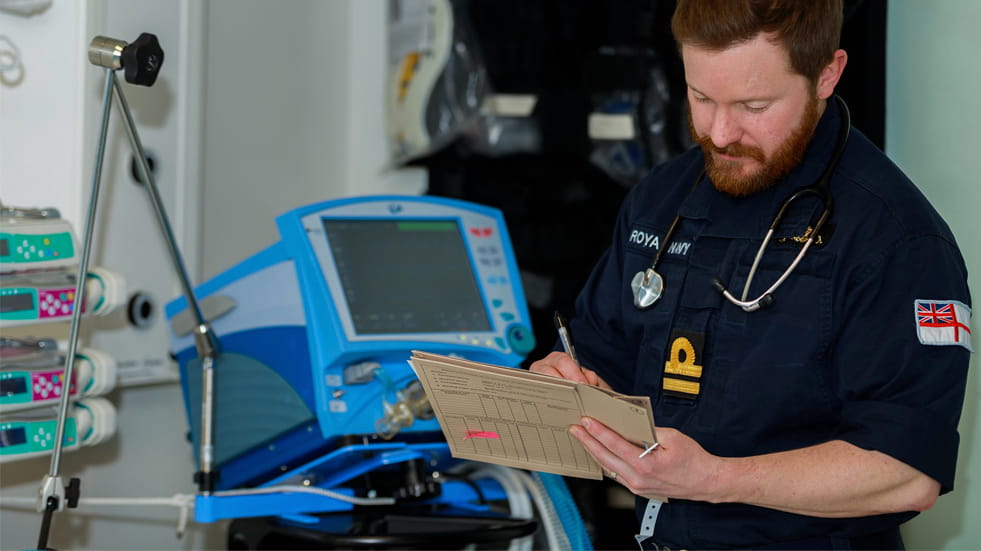Nursing Officer
You’ll use your extensive medical skills in a wide range of contexts, from an NHS hospital to some of the most challenging environments in the world.
- £32,000 - £103,000
- Undergraduate Degree
- Surface Fleet
- Medical
- Officer level
£38,700
£55,000
Degree
6 weeks
Free
Travel

I have taken my nursing skills all over the world and worked within some amazing teams, providing care for patients on board ships or in land environments.
Role details
What you’ll do
Life as a Nursing Officer offers extraordinary challenges and responsibilities, but comes with opportunities and rewards to match.
Wherever you go in the world and whatever you’re doing, you’ll play a key part in safeguarding our personnel and civilians alike. You could be in an NHS hospital caring for returning military personnel, or out in the field working in a conflict zone.
Whatever you do, you’ll encounter some of the most challenging environments imaginable, developing both personally and clinically as you experience a life few medical professionals can imagine.
Your role
- Lead a team providing medical support to Royal Navy and Royal Marines personnel on shore and at sea, in the UK and around the world.
- Develop and maintain your clinical skills in order to take those skills around the world on operations when required. During peacetime, you’ll be based within a Joint Hospital Group Unit in either Plymouth, Portsmouth or Birmingham.
- Gain clinical and management experience and take responsibility for mentoring junior nurses and medical assistants.
- Wider job opportunities as your career progresses in senior leadership positions, clinical governance, training, operations and deployed roles including as a Head of Department or Senior Nursing Officer.
- Be part of a world-class medical service that’s recognised far beyond the Armed Forces. You’ll represent our nation whatever you’re doing and wherever you are.
Pay & benefits
- A salary that rises to at least £38,700 following basic military training
- Excellent pay and promotion prospects as your career progresses
- Sports and Adventurous Training opportunities
- Forces Help to Buy house purchase scheme
- Six weeks of paid holiday every year
- Free medical and dental care
Skills for life
Qualifications you'll gain
- An opportunity to study further at degree or masters level, to top up your professional portfolio
- You’ll have the opportunity to carry out specialist courses funded by the Royal Navy, in areas such as Intensive Care, Emergency Medicine, Trauma and Orthopaedics and Primary Care.
- Civilian recognised leadership and management qualifications
Skills you'll develop
- Unique nursing care, including assessment, treatment and management that can be utilised in a variety of environments all over the world
- How to use your expertise and develop your leadership and management skills in a maritime environment
- Become a Divisional Officer, responsible for the welfare and development of other junior clinical personnel.
Eligibility
- Aged 20 to 39
- A degree in Adult Nursing is required - you can apply in the final year of completing your degree to be selected
- Registered with the Nursing Midwifery Council (NMC)
- 5 grades A*-C (9-4) Including grade 6 (B) or above in English Language and Maths
- A National of the United Kingdom, a Commonwealth citizen or Dual National
- A Body Mass Index (BMI) between 18 and 28 (between 17 and 27 if under 18)
Skills & Interests
- A caring and compassionate nature
- Decisive with strong independent thinking
- Highly organised and able to remain cool under pressure
- Approachable as a strong team leader
Joining Process
From picking your role to starting on your first day, these are the steps you'll take to join as a rating.
Submit an application
Defence Aptitude Assessment (DAA)
You’ll be tested on: Verbal Reasoning, Numerical Reasoning, Work Rate, Spatial Reasoning, Electrical Comprehension and Mechanical Comprehension.
To prepare, you can practise the DAA
Interview
Medical and eye tests
Pre-Joining Fitness Test (PJFT)
Admiralty Interview Board (AIB)
Nurses Selection Board
Start training
Career Progression
Got a question?
Our virtual recruiter is available to answer your questions 24 hours a day
